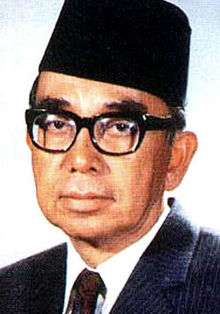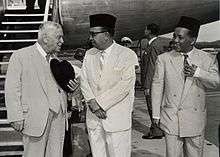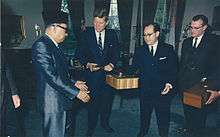Abdul Razak Hussein
| Yang Amat Berbahagia Tun Abdul Razak Hussein S.M.N. | |
|---|---|
 | |
| 2nd Prime Minister of Malaysia | |
|
In office 22 September 1970 – 14 January 1976 | |
| Monarch |
Abdul Halim Yahya Petra |
| Deputy |
Ismail Abdul Rahman Hussein Onn |
| Preceded by | Tunku Abdul Rahman |
| Succeeded by | Hussein Onn |
| 1st Deputy Prime Minister of Malaysia | |
|
In office 31 August 1957 – 22 September 1970 | |
| Monarch |
Abdul Rahman Hisamuddin Putra Ismail Nasiruddin |
| Prime Minister | Abdul Rahman |
| Preceded by | Position established |
| Succeeded by | Ismail Abdul Rahman |
| Personal details | |
| Born |
Abdul Razak bin Hussein 11 March 1922 Pekan, Pahang, British Malaya (now Malaysia) |
| Died |
14 January 1976 (aged 53) London, United Kingdom |
| Resting place | Makam Pahlawan, Masjid Negara, Kuala Lumpur, Malaysia |
| Citizenship | Malaysian |
| Political party | United Malays National Organisation (1953–1976) |
| Other political affiliations | Labour Party (1945 - 1953) |
| Spouse(s) | Rahah Noah |
| Children | 5 (including Najib Razak and Nazir Razak) |
| Alma mater |
Raffles College Lincoln's Inn |
| Profession | Lawyer |
| Religion | Sunni Islam |
| Military service | |
| Allegiance |
|
| Service/branch | Rejimen Askar Wataniah |
| Years of service | 1941–1945 |
| Rank | Captain |
| Unit | Force 136 |
Tun Tun Haji Abdul Razak bin Dato' Haji Hussein (Jawi: عبدال رازک حسین) (11 March 1922 – 14 January 1976) was the second Prime Minister of Malaysia, ruling from 1970 to 1976.
Tun Razak was the Prime Minister responsible in setting up Barisan Nasional, which is the ruling coalition of political parties that have held power in Malaysia till today, taking over from its predecessor, the Alliance. He is also renowned for launching the Malaysian New Economic Policy (MNEP).
Background
Born in Pekan, Pahang on 11 March 1922,[1] Tun Razak is the first of two children to Dato' Hussein bin Mohd Taib and Datin Hajah Teh Fatimah bt Daud. Of aristocratic descent, Abdul Razak studied at the Malay College Kuala Kangsar.
After joining the Malay Administrative Service in 1939, he was awarded a scholarship to study at Raffles College in Singapore in 1940. His studies at the college ceased with the onset of the Second World War. During the war he helped organise the Wataniah resistance movement in Pahang.[2]
After World War II, Tun Razak left for Britain in 1947 to study law. In 1950 he received a law degree and qualified as barrister at Lincoln's Inn in London. During his student days in England, Tun Razak was a member of the British Labour Party and a prominent student leader of the Kesatuan Melayu Great Britain (Malay Association of Great Britain). He also formed the Malayan Forum, an organisation for Malayan students to discuss their country's political issues.
Political involvement

Upon his return from the United Kingdom, in 1950, Tun Razak joined the Malayan Civil Service.[1] Owing to his political calibre, he became the youth chief for United Malays National Organisation (UMNO). Two years later, he worked as the Assistant State Secretary of Pahang and in February 1955, at just 33 years of age, became Pahang's Chief Minister.
Razak stood in and won a seat in Malaysia's first general elections in July 1955 and was appointed as the Education Minister. He was instrumental in the drafting of the Razak Report which formed the basis of the Malayan education system. Tun Razak was also a key member of the February 1956 mission to London to seek the independence of Malaya from the British.[1]
After the general elections in 1959, he became the Minister of Rural Development in addition to holding the portfolios of Deputy Prime Minister and Minister of Defence, which he held from 1957.[1] His achievements include formulating the development policy known as the Red Book.
Infusing young blood
At the time of Separation of Singapore from the Federation of Malaysia in 1965, Tun Razak realised that UMNO needed more young leaders in the party. Faced with, amongst other things Lee Kuan Yew's considerable rhetorical skills, Razak wanted young Malay leaders – grounded in their own faith and culture – who would be able to speak and if necessary debate both in the Malay language and English language.
Razak understood that power resided in the Malay community and that for this power to be wielded effectively, the elite among the Malays had to be an elite determined by ability, aptitude and commitment to the nation as a whole. Class, birth and money were secondary in his calculations.
As a consequence of this initiative, the then young leaders of mixed heritage in UMNO, such as Mahathir Mohamad, were drafted into higher echelons of the political establishment.
In 1967 he was awarded the Ramon Magsaysay Award for community leadership.
Prime Ministership
After the 13 May Incident in 1969, his faction in UMNO overthrew Tunku Abdul Rahman Putra and imposed a State of Emergency, ruling by decree as the National Operations Council until 1970.[1] On September 1970, Tun Razak succeeded Tunku Abdul Rahman Putra as the Prime Minister of Malaysia.
Tun Razak set up the Barisan Nasional or National Front on 1 January 1973 to replace the ruling Alliance Party. He increased the membership of its parties and coalitions in an effort to establish "Ketahanan Nasional" (National Strength) through political stability.
Tun Razak is also renowned for launching the Malaysian New Economic Policy (MNEP) in 1971. He and the "second generation" of Malay politicians saw the need to tackle vigorously the economic and social disparities which fuelled racial antagonism. The MNEP set two basics goals – to reduce and eventually eradicate poverty, and to reduce and eventually eradicate identification of economic function with race.
Death
Due in part to leukaemia, Abdul Razak died in office on 14 January 1976[1] while seeking medical treatment in London. He was posthumously granted the soubriquet Bapa Pembangunan (Father of Development). He was laid to rest in Heroes Mausoleum near Masjid Negara, Kuala Lumpur.
Awards and recognitions

Honours of Malaysia
-
 Malaysia :
Malaysia :
-
_-_DMN.svg.png) Recipient of the Order of the Crown of the Realm (1976)[3]
Recipient of the Order of the Crown of the Realm (1976)[3] -
_-_SMN.svg.png) Grand Commander of the Order of the Defender of the Realm (1959)[4][1]
Grand Commander of the Order of the Defender of the Realm (1959)[4][1]
-
- Tun Razak was posthumously granted the sobriquet Bapa Pembangunan (Father of Development).
Places after him
Several places were named after him, including:
- There are several roads and highways in Malaysia and one in Indonesia named after Tun Razak such as Tun Razak Highway (Federal Route
 connecting Segamat, Johor to Gambang, Pahang), Jalan Tun Razak in Kuala Lumpur (part of Kuala Lumpur Middle Ring Road 1), Jalan Tun Abdul Razak in Johor Bahru (part of Skudai Highway), Jalan Tun Abdul Razak in Ipoh (also known as Maxwell Road), Jalan Tun Abdul Razak in Melaka City (street name for Melaka Bypass), Jalan Tun Razak in Kota Kinabalu, Jalan Tun Abdul Razak in Gowa, Indonesia (known as Jalan Hertasning Baru and Jalan Aroepala) and Jalan Tun Razak in Precinct 2 Putrajaya
connecting Segamat, Johor to Gambang, Pahang), Jalan Tun Razak in Kuala Lumpur (part of Kuala Lumpur Middle Ring Road 1), Jalan Tun Abdul Razak in Johor Bahru (part of Skudai Highway), Jalan Tun Abdul Razak in Ipoh (also known as Maxwell Road), Jalan Tun Abdul Razak in Melaka City (street name for Melaka Bypass), Jalan Tun Razak in Kota Kinabalu, Jalan Tun Abdul Razak in Gowa, Indonesia (known as Jalan Hertasning Baru and Jalan Aroepala) and Jalan Tun Razak in Precinct 2 Putrajaya - Bandar Tun Razak in Kuala Lumpur and Bandar Tun Abdul Razak, Pahang are the towns named after Tun Razak.
- The most prominent landmark in Georgetown, Penang is the KOMTAR building, the Tun Abdul Razak Complex, housing stores and offices. Another building of the same name was also built in Johor Bahru.
- The SK Tun Abdul Razak primary schools in Kuala Kubu Bharu, Selangor.
- The SMK Tun Abdul Razak secondary schools both in Selekoh, Perak and Kuching, Sarawak.
- The Tun Abdul Razak Research Centre in Brickendonbury, England, is named in his.
- KD Tun Abdul Razak, a Scorpene class submarine of the Royal Malaysian Navy
- Tun Abdul Razak Chancellor Hall (DECTAR) at the National University of Malaysia (UKM) in Bangi, Selangor
- Tun Abdul Razak Library (PTAR) at MARA University of Technology (UiTM), Shah Alam, Selangor
- MRSM Tun Abdul Razak, MARA Junior Science College in Pekan, Pahang.
- Sekolah Berasrama Penuh Integrasi Tun Abdul Razak (SBPITAR), integrated boarding school in Pekan, Pahang
- Sekolah Dato' Abdul Razak (SDAR), all-boys boarding school in Seremban, Negeri Sembilan.
- Universiti Tun Abdul Razak (UNITAR), private university in Kuala Lumpur.
- Tun Abdul Razak Residential College, one of residential college in Universiti Malaysia Perlis
- Tun Razak Hockey Stadium, located in the Jalan Duta National Sports Complex, Kuala Lumpur.
- Dewan Tun Abdul Razak is another gallery of Sarawak Museum.
- Institut Teknologi Tun Abdul Razak, private institution in Petaling Jaya, Selangor
- Tun Abdul Razak Hockey Cup
- Tun Abdul Razak Heritage Park, public recreational park in Kuala Lumpur
- Tun Abdul Razak Memorial
- Piala Tun Hj. Abdul Razak bin Hussein, trophy that is awarded to the winner of Pertandingan Bahas Piala Perdana Menteri in Hari Anugerah Kecemerlangan Sekolah Berasrama Penuh
- Bandar Tun Abdul Razak Jengka, Pahang
References
- 1 2 3 4 5 6 7 Hoiberg, Dale H., ed. (2010). "Abdul Razak bin Hussein, Tun Haji". Encyclopedia Britannica. I: A-ak Bayes (15th ed.). Chicago, IL: Encyclopedia Britannica Inc. p. 21. ISBN 978-1-59339-837-8.
- ↑ 1967 Ramon Magsaysay Award for Community Leadership – Tun Abdul Razak
- ↑ "Senarai Penuh Penerima Darjah Kebesaran, Bintang dan Pingat Persekutuan Tahun 1976." (PDF).
- ↑ "Senarai Penuh Penerima Darjah Kebesaran, Bintang dan Pingat Persekutuan Tahun 1959." (PDF).
External links
- Tun Razak’s legacy – his vision, The Star, 2 March 2008.
- The band of brothers C. S. TAN, The Star, 2 March 2008.
| Political offices | ||
|---|---|---|
| New office | Deputy Prime Minister of Malaysia 1957–1970 |
Succeeded by Ismail Abdul Rahman |
| Preceded by Abdul Rahman |
Prime Minister of Malaysia 1970–1976 |
Succeeded by Hussein Onn |

.jpg)